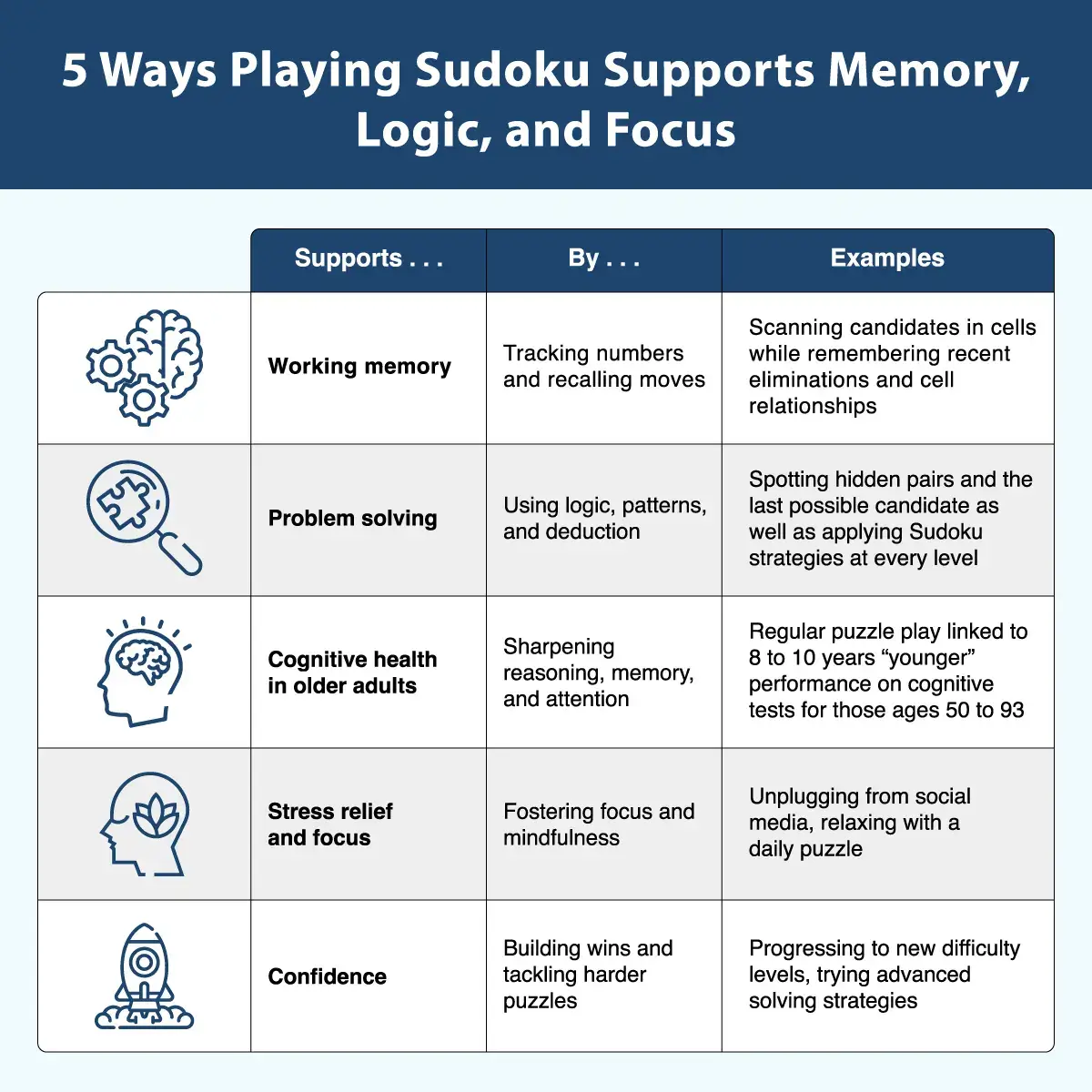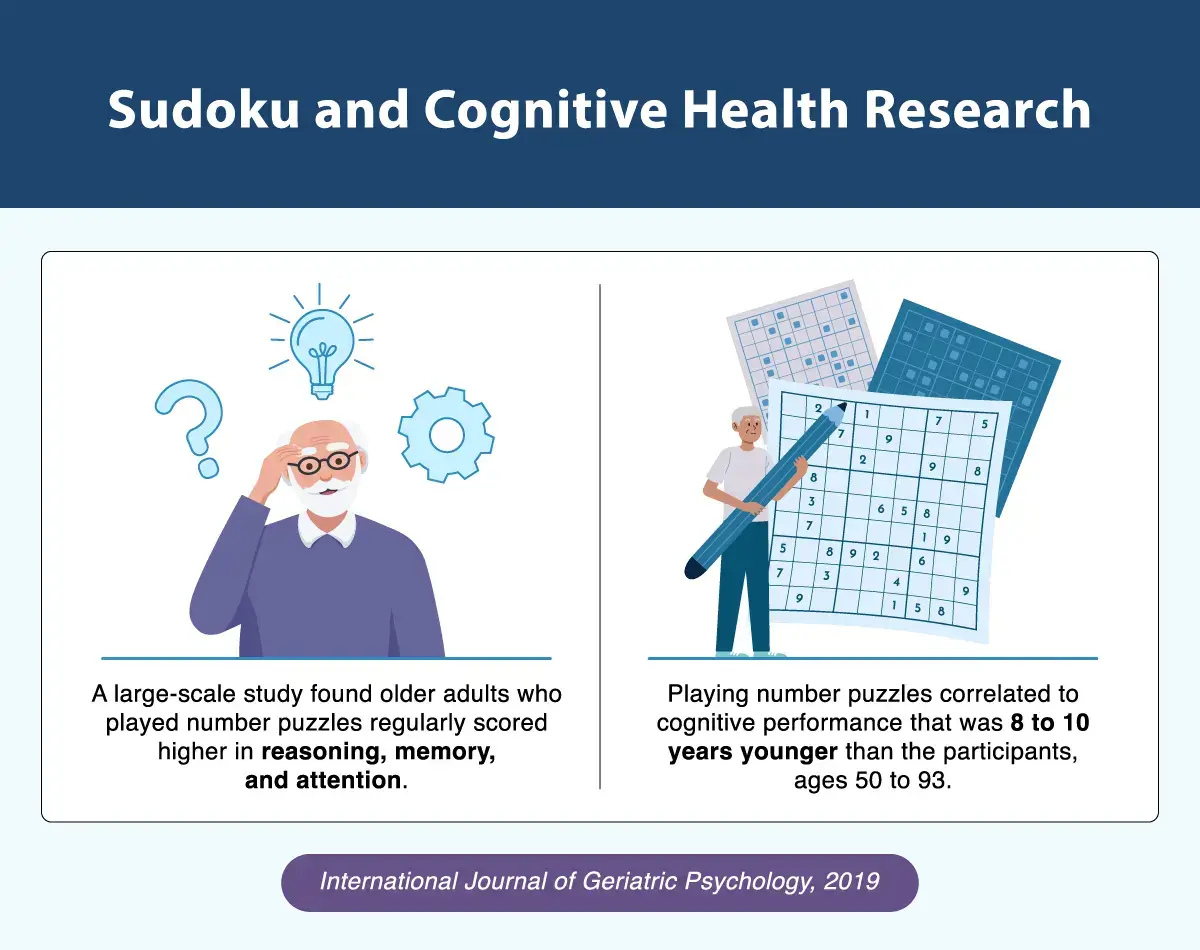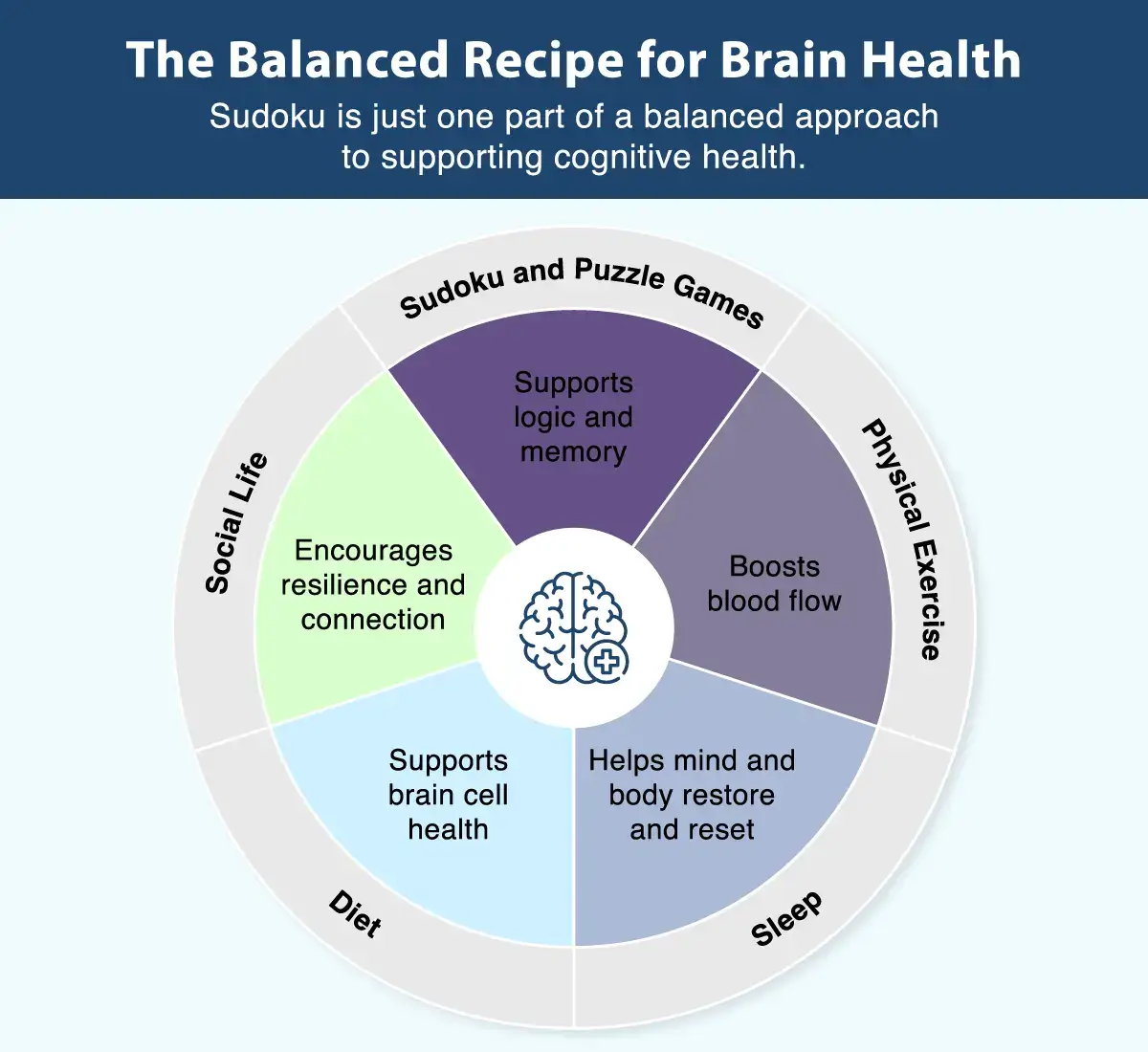Is Sudoku Good for Your Brain?
Sudoku is more than just a popular puzzle game. It’s also a powerful way to keep your brain active. By engaging memory, logic, and concentration, solving Sudoku puzzles may support short-term cognitive function, offer a great way to relax, and challenge your mind with engaging puzzle workouts.
While researchers caution that no single game can stop cognitive decline, studies show that number puzzles like Sudoku support cognitive stimulation, executive function, and overall well-being, especially in older adults.
Because everything from planning and focus to controlling your impulses rely on your executive functioning skills, this post details how playing Sudoku online can be a practical, valuable brain-boosting activity with multiple benefits.
Top 5 Sudoku Benefits for Your Mind, Body, and Soul
Brain-training games such as Sudoku activate the prefrontal cortex, the area responsible for logical thinking, critical thinking, and executive functioning. And playing Sudoku regularly gives your executive functions a workout, specifically, skills like decision-making, problem-solving, and working memory.

1. Enhances Working Memory
Short-term memory and working memory get a direct workout every time you solve a grid. When you focus on candidate numbers while doing your Sudoku scanning or using deductive reasoning to eliminate options, you’re actively practicing the same cognitive skills that help with learning, problem-solving, and recall.
A large-scale study of older adults found that frequent play of number puzzles like Sudoku correlated with stronger performance on memory and attention tasks, suggesting benefits that may help buffer cognitive decline.
2. Improves Problem-Solving Skills and Logical Thinking
At its core, Sudoku is a problem-solving puzzle game. Each grid demands pattern recognition, such as searching for X-wings or hidden pairs, as well as step-by-step deductive reasoning and flexible decision-making. Because each grid is completely different, you have to adapt each time you start a new puzzle.
As you solve puzzles, you employ Sudoku strategies that build on previous knowledge gains, and the methodical nature of solving offers a blueprint for approaching each new grid. And because Sudoku follows strict rules, you can use them as a framework for logical thinking as you reason through each puzzle. These mental exercises reinforce patterns of problem-solving and logic that are essential components of your executive functioning.
3. Supports Cognitive Health in Older Adults
Playing Sudoku alongside other brain-training games, such as crossword puzzles, may contribute to better long-term cognitive health. Research in the International Journal of Geriatric Psychiatry linked frequent puzzle play with higher scores on reasoning, attention, and cognitive abilities, showing that consistent cognitive training can sharpen the mind even in later life.
While it’s not a cure for Alzheimer’s disease, these games may support cognitive reserve and overall well-being in older adults. However, researchers also note that such studies are observational, meaning they can show correlation, not proof of cause and effect. Other lifestyle factors like diet, exercise, and social interaction play a major role in cognitive health, too.

4. Supports Stress Relief, Focus, and Wellness
Beyond boosting brain power, Sudoku also contributes to overall wellness. Relaxing with a puzzle can reduce stress, support mental clarity, and help you unplug from social media or other daily distractions. This focus creates a balance of challenge and skill that promotes satisfaction and supports emotional well-being.
This balanced focus can be described as a flow state, a mental zone where focus and concentration deepen, stress hormones decrease, and the puzzle itself becomes a kind of mindful meditation, similar to the calm focus people find in yoga or deep breathing. Research on flow in older adults shows that immersive, absorbing engagement arises when a task’s demands match the solver’s cognitive ability—neither too easy nor too hard—making Sudoku’s carefully calibrated challenge a natural path for you to enter a flow state.
5. Boosts Your Confidence
Playing Sudoku is a challenge, so when you complete a puzzle correctly, especially if you’re able to move on to harder puzzles, it can be a real confidence booster! That sense of accomplishment isn’t just psychological. That surge of satisfaction is tied to your brain’s reward system. Research shows that dopamine, which is a key neurotransmitter, plays a central role in how your brain registers rewards, motivation, and the pull toward rewarding activities.
So, when you solve a puzzle, it may come with a subtle dopamine boost that reinforces the positive feeling, making you more likely to keep going. Additionally, by using Sudoku strategies, you not only practice problem solving, but you enhance your ability to look at problems in different ways. Learning how to solve puzzles in new ways allows you to try out advanced Sudoku strategies and increase your ability and confidence at solving even more!
Sudoku’s Role in a Balanced Brain-Health Routine
Sudoku is a great tool for keeping your mind sharp, but no single activity can deliver complete brain health on its own. Research shows that while number puzzles support memory, focus, and logical reasoning, they aren’t a cure-all. For the best results, Sudoku should be one part of a broader lifestyle that nurtures your cognitive well-being.

Provides Stimulation, Not Prevention
Sudoku helps sharpen logic and memory, but it cannot prevent or cure Alzheimer’s disease or other dementias. While puzzle games offer valuable exercise for your mind, they aren’t a substitute for medical care.
Strengthens Some Skills, Not All Skills
Just like you wouldn’t expect one type of exercise to keep your whole body fit, one puzzle game can’t address every area of brain function. Sudoku challenges reasoning, attention, and problem-solving. However, other areas of brain health, like emotional resilience, social connection, and creativity, come from different activities such as conversation and social interaction, learning, and artistic pursuits.
Delivers Benefits with the Right Challenge
The brain boost from Sudoku depends on consistency and difficulty. Easy puzzles may relax you without stretching your skills, while overly hard puzzles can frustrate instead of focus. Choosing puzzles that match your level makes Sudoku both enjoyable and effective.
True brain health comes from a mix of activities: puzzle games, regular movement, healthy diet, good sleep, and social connection. Together, these habits help reduce the risk of dementia and memory loss, while supporting lifelong cognitive skills and mental vitality.
Achieve Brain Bliss with Sudoku
Sudoku is an engaging number puzzle that strengthens executive functions, improves problem-solving skills, and supports cognitive health in older adults and younger players alike. While it won’t eliminate the risk of dementia, regularly playing Sudoku puzzles is one of the simplest, most enjoyable mental exercises you can do to keep your brain active, build cognitive reserve, and support overall well-being.